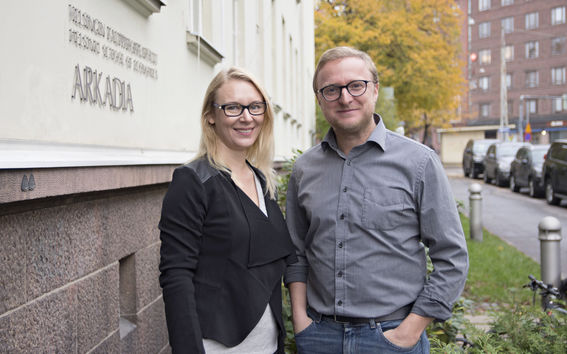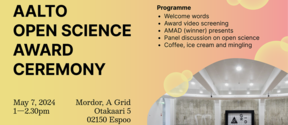Why is social entrepreneurship valued in Finland and in the US but not in South Korea and in Norway?

Virva Salmivaara and Ewald Kibler. Photo: Roope Kiviranta / Aalto University.
Experts see social enterprises as a more efficient solution to social problems in countries where either a liberal or a socialistic logic dominates in both market coordination and social welfare provision. However, in countries where market coordination and social welfare provision follow conflicting logics, national experts appreciate social entrepreneurship less.
A recently published study analyzed altogether 361 national experts’ views on social entrepreneurship in 11 selected capitalist countries. Data were retrieved from the Global Entrepreneurship Monitor, which covers information on entrepreneurial activity and its framework conditions from over 70 countries.
“Prior research shows that there is vast variation in social entrepreneurial activity levels across different countries. However, our study is the first one to show why national experts are supportive, or not supportive, of social entrepreneurship in their country”, Academy of Finland Fellow Ewald Kibler says. “Liberal market economies that provide few social welfare services, such as the United States and Switzerland, seem to offer the most support for social enterprises”, Ewald Kibler continues. Associate Professor Pekka Stenholm from the University of Turku adds, “Social enterprises are also highly appreciated in more coordinated economies that take responsibility for the social welfare of the citizens. Finland is a prime example of this type of a country.”
Ewald KiblerLiberal market economies seem to offer the most support for social enterprises.
“National governments need to be consistent in the way they control market activities and the production of social welfare services so that social enterprises can gain appreciation. For instance, liberal states tend to signal a great demand for the services of social enterprises, and enterprises are free to take up the role as social service providers. States following a more socialist logic tend to indicate that social welfare is a national mission and social enterprises are welcome to cooperate with the state and other public actors”, Post-Doctoral Researcher Virva Salmivaara explains.
Kibler and co-authors conclude that when states are liberal in one area but take an active role in another, this sends a mixed message and social enterprises are less valued. South Korea and Norway are examples of such countries as in these countries markets are coordinated but their governments provide few social services.
Social enterprises are organizations that operate commercially but also aim at increasing social or environmental well-being. They usually have both social and business goals. Linnanmäki amusement park is a Finnish example of a social enterprise as it raises funds for child welfare work. Another example is TOMS, a US shoe manufacturer that helps people in developing countries with the profit they make.
More information:
Ewald Kibler, Academy of Finland Fellow
Aalto University, Department of Management Studies
+358403538442
[email protected]
Virva Salmivaara, Post-Doctoral Researcher
Aalto University, Department of Management Studies
+358504418111
[email protected]
Pekka Stenholm, Associate Professor
University of Turku, School of Economics, Pori Unit
+358505056537
Reference:
Kibler, E., Salmivaara, V, Stenholm, P. & Terjesen, S. 2018. The Evaluative Legitimacy of Social Entrepreneurship in Capitalist Welfare Systems. Journal of World Business, 53(6), 944–957.
- Published:
- Updated:
Read more news

Aalto ARTS alum Vidha Samya’s artwork featured at the Venice Biennale 2024
The Pavilion of Finland presents ‘The pleasures we choose’ at the 60th International Art Exhibition – La Biennale di Venezia until 24 November 2024.
IoT Forge donates EUR 1 million to the School of Engineering
The donation will be used for research and education on the Industrial Internet and digital twins.
Join us for the first Aalto Open Science Award Ceremony
All Aaltonians are welcome – no registration required!